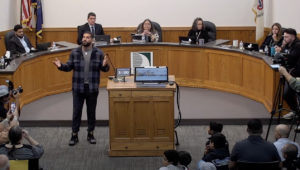School districts use ‘go-away’ prices on records requests to avoid transparency
(The Sentinel) – Fox News reports that parents across the country pursuing transparency are being charged exorbitant amounts by school districts in response to requests for curricula used to teach…

(The Sentinel) – Fox News reports that parents across the country pursuing transparency are being charged exorbitant amounts by school districts in response to requests for curricula used to teach their children.
In Rhode Island, for instance, one mother was billed $74,000 when she tried to review the materials.
“I received an estimate for, say, $80 for information that I requested,” Nicole Solas told Fox News. “And then when I requested similar information, a month later, the price skyrocketed to $2,600. So schools will charge you whatever price they want to charge you. So that way you’re not going to know what your kids are learning in school.”
Another parent in Maryland requested emails spanning a month from several entities and was given a bill for $5,000, Fox News reported. She never got the records because she was unwilling to pay so much for records her “tax dollars already paid for.”
High fees are a standard tactic to avoid transparency
Exorbitant fees to fill open records requests are fairly standard practice across the country and in Kansas. Known as a “go away price” the hope is if a news organization or resident is quoted an outrageous sum for records they’ll simply drop the request.
It’s a situation that has prevailed for decades and that previous changes to the Kansas Open Records Act (KORA) have attempted to combat — indeed, as recently as 2015 Kansas has ranked 43rd overall in transparency.
Legislation to fix some of the deficiencies in KORA failed in the Legislature in 2022.
KORA states: “It is the public policy of Kansas that public records shall be open for inspection by any person unless otherwise provided, and this act shall be liberally construed and applied to promote such policy.”
KORA does allow custodial agencies to recoup costs as well as a “reasonable copying fee” which is defined in the law as 25 cents per page.
Records custodians are allowed under current Kansas law to charge not just for the staff time needed for copying but for the time it takes to find the records — and to require payment in advance before it’s clear there are even any records responsive to the request.
In 2019, for example, both the Pittsburg Morning Sun and local television station KOAM-TV filed substantially similar records requests in relation to the abrupt firing of the city administrator, city clerk, and city attorney, and — after initially refusing to even considerthe requests — attempted to charge both organizations $3,500 each.
KOAM filed a formal complaint with Kansas Attorney General Derek Schmidt who ruled that Frontenac had violated KORA in several areas, including trying to charge hundreds of dollars per hour for an attorney to review records before providing them to the media.
The Sentinel and its parent company, Kansas Policy Institute, have had school districts and other entities try the ‘go away price’ other tactics. Kansas State University once tried to charge $9,600 to determine whether the university had any employment contracts.
Under Superintendent Pam Stranathan, the Gardner-Edgerton school district repeatedly attempted to prevent the release of public information.
As a letter to the editor in the Gardener News shows, trouble with obtaining records from the district goes back more than a decade, with steadily increasing charges.
Moreover, a Sept. 3 editorial in the News notes they had trouble getting a copy of Stranathan’s contract extension — with the district refusing to email a six-page document until it was paid 72 cents.
“We wish we could say it’s not usually like this dealing with USD 231, but it is,” the editorial reads. “Don’t blame the employees, it’s the administration and BOE that create the problem. By causing a hassle, and keeping secrets they retain control.
“It’s not unusual to have to threaten a lawsuit to get KORA requests answered. USD 231 pays an attorney to stall KORA requests, just to be obtuse.”
Government tactics to avoid transparency
Other tactics used by school districts and other local entities to avoid transparency include:
- Overcharging – KORA allows charges to recoup the cost of providing records, but the Sentinel and our parent company, Kansas Policy Institute, have rejected many attempts to charge more than what is allowed under the law.
- Rejecting request for documents in Excel-compatible format – the Gardner Edgerton district tried this tactic when Kansas Policy Institute requested the district’s payroll listing; they eventually provided the information electronically after the Johnson County District Attorney’s office intervened.
- Requiring KORA requests be submitted on a city-designed form – guidance from the Attorney General’s office says citizens are only required to provide their name and a description of the information requested. You cannot be asked to disclose the name of your employer, how you intend to use the information, or to make your request in a particular format; a simple email is sufficient. There is an exception if you are requesting names or addresses of government employees; you can be asked to certify that the information won’t be used for commercial purposes, but that certification does not have to be on a government-prescribed form.
- Requiring payment to be made in-person, in cash or check, and refusing to accept cards.
The Attorney General’s office has additional guidance on Open Records requests that may be helpful.



